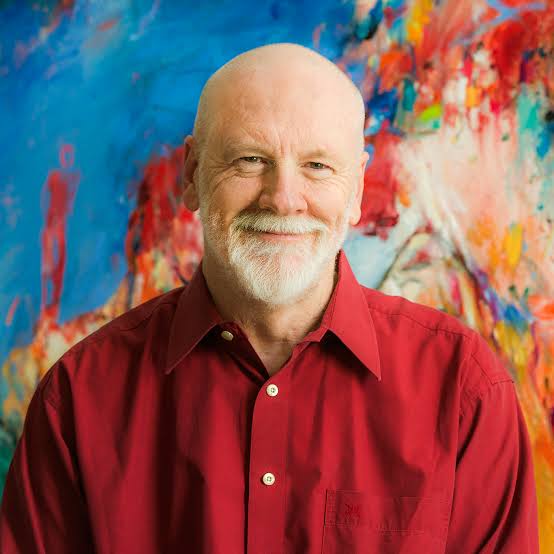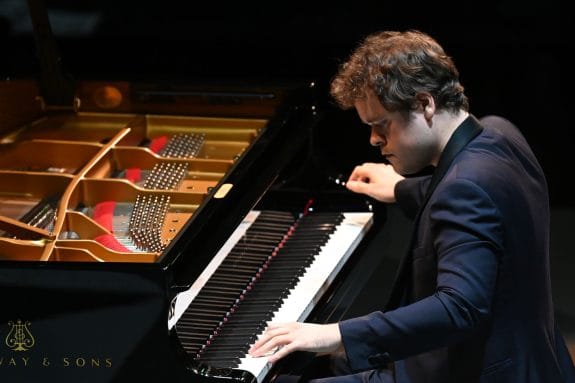Benjamin Grosvenor at the Wigmore: Brett Dean, Bach, Brahms
A phenomenal beginning to what I truly hope was an enriching day

Bach – Prelude in E minor, BWV 955a (transcribed Siloti)
Brett Dean – Hommage à Bach (2010): Prélude; Hommage à Kurtág (2011); Music for Drakenstein – Two Etudes (2018, world première); Hommage à Janáček (2009); Hommage à Lutosławski (2017); Hommage à Bach (2010): Chorale; Faustian Pact (Hommage à Liszt) (2023, UK premiere)
Brahms – Klavierstücke, Op.119 (1893), interspersed with Dean’s Hommage à Brahms (2013)
This concert launched a whole day at Wigmore Hall dedicated to the music of Brett Dean; and indeed, the composer was present. He could hardly have asked for a finer opener, and I only wish I could bilocate to have heard the balance of events (unfortunately, I was pre-booked for Handel’s Arianna in Creta at St George’s, Hanover Square: the subject of yesterday's post).
There was a surprise addition to Grosvenor's programme: the Bach/Siloti Prelude in E minor, BWV 855a (Siloti moves the piece to B minor). Benjamin Grosvenor’s account as near perfect as one can accomplish. Bach transcriptions can be hit and miss in performance (I think back to Khatia Buniatishvili’s perverse Bach/Liszt Prelude in A minor in March this year), but this was a textbook demonstration of just how well they can work.
It was Brett Dean’s own set of Hommages that formed the meat of the recital though, including a UK premiere of Faustian Pact (Hommage à Liszt) and a world premiere of Music for Drakenstein. The first heard, though, was appropriately enough the Hommage à Bach, a piece commissioned for Angela Hewitt’s Bach Book. The piece was split into two, with the Prélude offered first and its companion piece, the Chorale, later. The Prélude’s toccata-like surface was delivered with impeccable fluency by Grosvenor. Dean’s harmonic and melodic twists and turns take the listener on a fabulously inventive journey; Dean’s Hommage à Kurtag, which followed on, references that composer’s quiet chorales as well as his penchant for clusters (worth noting that Grosvenor never plays in an ugly fashion, regardless of dynamic level). There is a personal element here for Dean: Kurtág was his ‘mentor’ at the Berlin Philharmonic in the mid-1990s, where Kurtág was Composer-in-Residence and Dean was a member of the viola section. A falling cluster motif is intended to echo one of the composer’s characteristic physical gestures. A fascinating piece, and a reaction that at once invokes Kurtág whilst maintaining Dean’s individuality.
Music for Drakenstein – Two Etudes was a world premiere. The two parts are ‘Tallying’ and ‘Envoy (Hommage à Beethoven)’. The piece was originally intended for a cancelled memorial performance at Drakenstein Prison in South Africa (where Nelson Mandela spent much of his imprisonment). The delay meant it had to wait until this event for its first performance. ‘Tallying’ refers to the way prisoners mark their days via lines etched on walls; repeated rhythms of four crotchets represents such lines, while the more horizontal lines (not quite melodies) refer to the imagination of the outside world. Grosvenor’s way with the gentle repetitions and the scurrying faster passages seemed perfect; the more Beethovenian-Busonian ‘Envoy (Hommage à Beethoven)’ takes the idea of freedom and flies with it, taking as a basis the Scherzo of that composer’s Piano Sonata, Op.27/1. A hair-raising toccata, this was superb music brilliantly performed.
The Janáček Hommage of 2009 made a perfect partner to that for Lutosławski (2017). First, the Janáček, harmonically colourful, virtuosic. Written for Italian virtuoso Emanuele Torquati, the piano part certainly asks much of the executant. Janáček’s core technique of the repetition of fragments and micro-motifs forms the basis of Dean’s own take. Grosvenor’s perfectly even trills were particularly impressive. The fluid Hommage á Lutosławski was composed for Gloria Cheng (who can be found playing it in a YouTube video below).
Cheng’s project was a memorial for the composer/musicologist Steven Stucky, whose work on Lutosławski’s music is well-known (I remember with warmth a lecture Stucky gave to graduate students at King’s College, London, back in the 1980s). The figuration here comes from the piano part of Lutosławski’s Third Symphony, while the end quotes that work’s ‘big tune’ (collectors will know the rival versions by the composer, and by Esa-Pekka Salonen well).
The Chorale from the Hommage à Bach was perfect programming (a transcription of the chorale ‘Gute Nacht, o Wesen’ from the motet, BWV 227 (not 277, as the Wigmore documentation claimed), Jesu, meine Freude. Peaceful, and given in a clean, even performance by Grosvenor, it was a perfect palette-cleanser.

Benjamin Grosvenor, photo © Chris Christodoulou
Benjamin Grosvenor has justly carved a huge reputation via his interpretations of the music of Franz Liszt. His reading of Dean’s Faustian Pact (Hommage à Liszt), written in 2023 and here the world premiere of the programme, was unforgettable. On first hearing, Dean, in his tribute to Liszt’s ‘harmonic quirkiness and originality as well as his daringly phosphorescent pianism’ (the composer’s words) offers music of dark urgency. There seems to be a reference to the late Liszt piece Nuages gris here, among other Lisztian tropes. The challenges are many, not least a fearsomely difficult left hand; Grosvenor delivers everything with aplomb and assurance, and yet with not a single superfluous gesture.
Finally, a sequence of Brahms and Dean, interspersed. The Dean Hommage à Brahms comprised three movements (‘Engelsflügel’ 1 and 2, with ‘Hafenkneipenmusik’ in the middle). Grosvenor’s Brahms is predictably excellent; but his alignment with Dean enabled this sequence to be heard in all its majesty. ‘Engelsflügel’ means ‘Wings of Angels’ while ‘Hafenkneipenmusik’ means ‘Harbourside Bar Music’. Music of opposites, then, as are the members of Brahms’s set. The premise for Dean’s own contributions is fascinating, as it honours the ‘absent other’ in Brahms’s life: Clara Schumann. So here is music that, to quote the composer, ‘grows out of accompanying figurations yet takes on a life of its own, shining a light on Brahms’s poignantly melancholic Op.119 pieces’.
The B minor piano piece that opens Op.119 is one of Brahms’s most harmonically testing, the descending thirds continually destabilising the core tonality. Brett’s response is a kind of internalisation of that in ‘Engelsflügel 1′ flighty and pedalled yet with a floating quality that owes nothing to Impressionists and everything to Dean’s own Weltanschauung. The second of Brahms’s four pieces shifts rhythmically, and yet here Grosvenor imbued it with real warmth. Dean’s response is complex, again scurrying, the ‘Harbourside Bar Music’ offering a complexity hardly hinted at via its title. There is an almost Lisztian virtuosity at work here, too, which seemed in context to glance back to Faustian Pact. Grosvenor’s Op.119/3 was bright and possessed of perfect voice-leading; Dean’s ‘Engelsflügel 2′ is an utterly remarkable response, the harmonies completely frozen (as is momentum). Grosvenor gave this all the space one could possibly want. It was only left to Brahms’s blaze-of-light E-flat major Op.119/4 to close, ringingly.
A phenomenal beginning to what I truly hope was an enriching day. If only I could bilocate …
Here's the sequence, in order, of the Brahms/Dean, played by Orli Shaham so you can get an idea of how this works:
Orli Shaham's disc can be purchased here (there is no Spotify for that disc).
